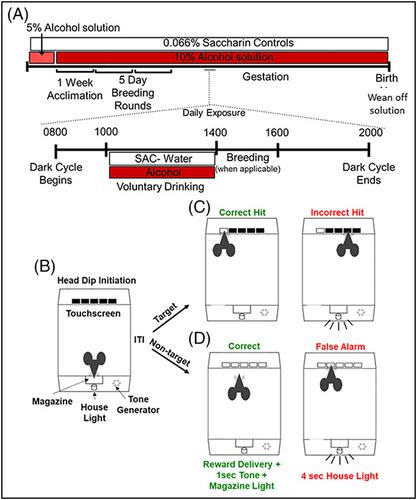当前位置:
X-MOL 学术
›
Genes Brain Behav.
›
论文详情
Our official English website, www.x-mol.net, welcomes your
feedback! (Note: you will need to create a separate account there.)
Moderate prenatal alcohol exposure impairs cognitive control, but not attention, on a rodent touchscreen continuous performance task.
Genes, Brain and Behavior ( IF 2.4 ) Pub Date : 2020-03-06 , DOI: 10.1111/gbb.12652 Sarah L Olguin 1, 2 , Shannon M Thompson 1 , Jared W Young 3, 4 , Jonathan L Brigman 1, 2
Genes, Brain and Behavior ( IF 2.4 ) Pub Date : 2020-03-06 , DOI: 10.1111/gbb.12652 Sarah L Olguin 1, 2 , Shannon M Thompson 1 , Jared W Young 3, 4 , Jonathan L Brigman 1, 2
Affiliation

|
A common feature associated with fetal alcohol spectrum disorders is the inability to concentrate on a specific task while ignoring distractions. Human continuous performance tasks (CPT), measure vigilance and cognitive control simultaneously while these processes are traditionally measured separately in rodents. We recently established a touchscreen 5‐choice CPT (5C‐CPT) that measures vigilance and cognitive control simultaneously by incorporating both target and nontargets and showed it was sensitive to amphetamine‐induced improvement in humans and mice. Here, we examined the effects of moderate prenatal alcohol exposure (PAE) in male and female mice on performance of the 5‐choice serial reaction time task (5‐CSRTT), which contained only target trials, and the 5C‐CPT which incorporated both target and nontarget trials. In addition, we assessed gait and fine motor coordination in behavioral naïve PAE and control animals. We found that on the 5‐CSRTT mice were able to respond to target presentations with similar hit rates regardless of sex or treatment. However, on the 5C‐CPT PAE mice made significantly more false alarm responses vs controls. Compared with control animals, PAE mice had a significantly lower sensitivity index, a measure of ability to discriminate appropriate responses to stimuli types. During 5C‐CPT, female mice, regardless of treatment, also had increased mean latency to respond when correct and omitted more target trials. Gait assessment showed no significant differences in PAE and SAC mice on any measure. These findings suggest that moderate exposure to alcohol during development can have long lasting effects on cognitive control unaffected by gross motor alterations.
中文翻译:

适度的产前酒精暴露会损害啮齿动物触摸屏连续执行任务的认知控制,但不会损害注意力。
与胎儿酒精谱系障碍相关的一个共同特征是无法专注于特定任务而忽略分心。人类连续执行任务 (CPT),同时测量警惕性和认知控制,而这些过程传统上在啮齿动物中单独测量。我们最近建立了一种触摸屏 5 选择 CPT (5C-CPT),它通过结合目标和非目标同时测量警觉性和认知控制,并表明它对安非他明引起的人类和小鼠的改善敏感。在这里,我们检查了雄性和雌性小鼠中度产前酒精暴露 (PAE) 对仅包含目标试验的 5 选择系列反应时间任务 (5-CSRTT) 和包含两者的 5C-CPT 表现的影响。目标和非目标试验。此外,我们评估了行为幼稚 PAE 和对照动物的步态和精细运动协调。我们发现,在 5-CSRTT 上,无论性别或治疗如何,小鼠都能以相似的命中率对目标呈现做出反应。然而,在 5C-CPT PAE 上,与对照组相比,PAE 小鼠做出了明显更多的误报反应。与对照动物相比,PAE 小鼠的敏感性指数显着降低,这是一种区分对刺激类型的适当反应的能力的衡量标准。在 5C-CPT 期间,雌性小鼠,无论治疗如何,在正确和省略更多目标试验时,平均反应潜伏期也增加。步态评估显示 PAE 和 SAC 小鼠在任何方面都没有显着差异。
更新日期:2020-03-06
中文翻译:

适度的产前酒精暴露会损害啮齿动物触摸屏连续执行任务的认知控制,但不会损害注意力。
与胎儿酒精谱系障碍相关的一个共同特征是无法专注于特定任务而忽略分心。人类连续执行任务 (CPT),同时测量警惕性和认知控制,而这些过程传统上在啮齿动物中单独测量。我们最近建立了一种触摸屏 5 选择 CPT (5C-CPT),它通过结合目标和非目标同时测量警觉性和认知控制,并表明它对安非他明引起的人类和小鼠的改善敏感。在这里,我们检查了雄性和雌性小鼠中度产前酒精暴露 (PAE) 对仅包含目标试验的 5 选择系列反应时间任务 (5-CSRTT) 和包含两者的 5C-CPT 表现的影响。目标和非目标试验。此外,我们评估了行为幼稚 PAE 和对照动物的步态和精细运动协调。我们发现,在 5-CSRTT 上,无论性别或治疗如何,小鼠都能以相似的命中率对目标呈现做出反应。然而,在 5C-CPT PAE 上,与对照组相比,PAE 小鼠做出了明显更多的误报反应。与对照动物相比,PAE 小鼠的敏感性指数显着降低,这是一种区分对刺激类型的适当反应的能力的衡量标准。在 5C-CPT 期间,雌性小鼠,无论治疗如何,在正确和省略更多目标试验时,平均反应潜伏期也增加。步态评估显示 PAE 和 SAC 小鼠在任何方面都没有显着差异。











































 京公网安备 11010802027423号
京公网安备 11010802027423号